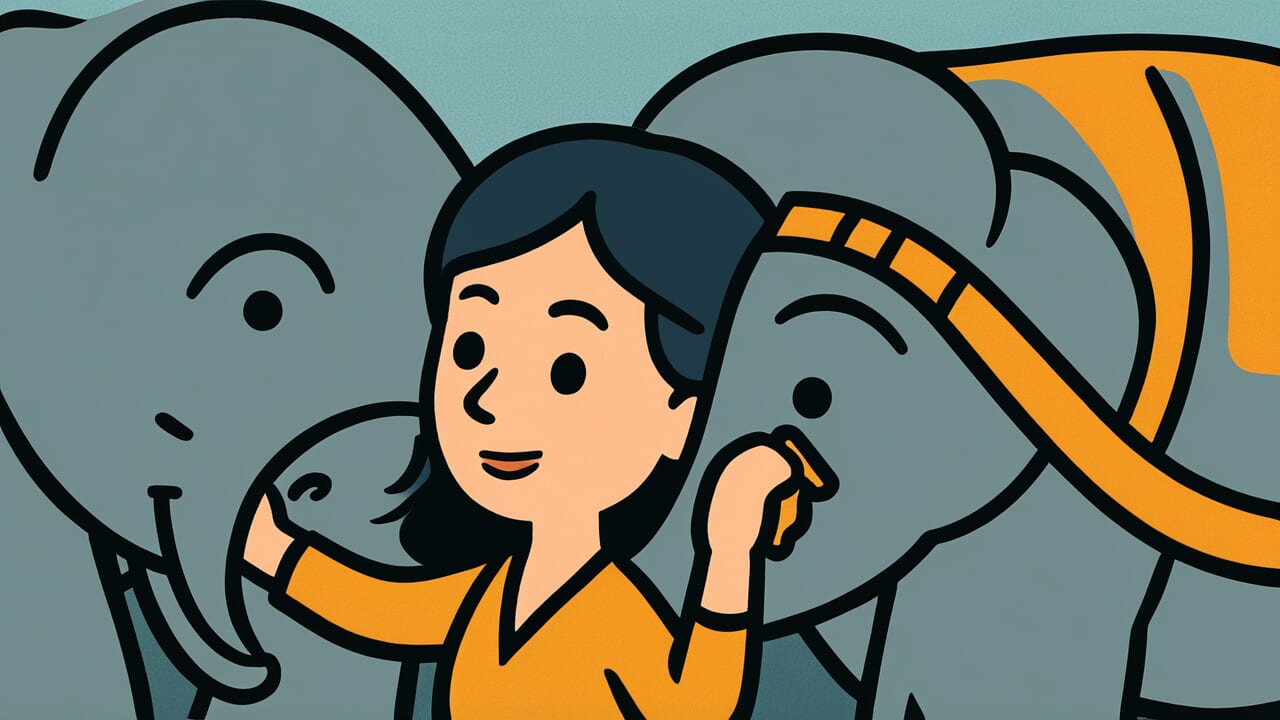How to Read “Even a large elephant can be tied with a woman’s hair”
Onna no kami no ke ni wa taizō mo tsunagaru
Meaning of “Even a large elephant can be tied with a woman’s hair”
This proverb means that even small, weak forces can achieve incredible power when they come together in large numbers.
People mainly use this saying when talking about the importance of unity and cooperation.
When facing a huge goal that seems impossible to achieve alone, this proverb gives hope. It reminds us that small contributions from many individuals can definitely lead to success.
The reason this expression works so well is its visual impact. The extreme contrast between a single thin hair and a massive elephant creates a powerful image in people’s minds.
Even today, this lesson remains true when discussing teamwork or community strength. When you feel powerless alone, remember that joining forces with others can overcome any difficulty.
This proverb gives us courage to keep trying.
Origin and Etymology
The exact first appearance of this proverb in literature is unclear. However, the structure of the phrase reveals an interesting background.
The contrast between “a woman’s hair” and “a large elephant” forms the heart of this saying. Everyone knows that a single strand of hair is so thin and weak that it breaks easily.
Meanwhile, elephants are the largest land animals, and their strength is immeasurable. Since ancient times, elephants have been treated as symbols of power.
This extreme contrast was probably created to teach about “the power of unity.” A single hair serves no purpose on its own.
But when thousands or tens of thousands of hairs are bundled together, they gain surprising strength. In reality, bundled hair is much stronger than you might imagine and doesn’t break easily.
Japan has long had many sayings that teach the importance of unity and cooperation, such as “the three arrows” teaching. This proverb likely expresses the same philosophy using the more familiar material of “hair.”
By using something as everyday as women’s hair as an example, the lesson becomes relatable to everyone.
The fact that it mentions elephants, animals from foreign lands, suggests possible influence from the Asian continent.
Usage Examples
- Each individual signature is a small force, but “even a large elephant can be tied with a woman’s hair,” so we can surely move society
- The small shops decided to work together to revitalize the shopping district, because as they say, “even a large elephant can be tied with a woman’s hair”
Universal Wisdom
This proverb has been passed down through generations because it captures two contradictory feelings that humans fundamentally possess.
The first is the sense of individual powerlessness. Everyone experiences moments when they painfully realize how small their own power is.
Standing before the great currents of society, we wonder what we can possibly do. This loneliness and helplessness is a timeless human struggle.
The second is the hope to accomplish something despite this feeling. We don’t want to give up. We want to change things. We want to make things better.
This passionate desire is also an essential part of human nature.
What makes this proverb beautiful is that it doesn’t deny either feeling. Instead, it acknowledges both and shows a path forward.
You are indeed weak. But you’re not alone. When people with small powers gather together, they can move even an elephant.
Our ancestors knew this truth. Humans are fragile alone, but by connecting with others, we become beings with infinite possibilities.
That “connection” has been humanity’s greatest weapon for survival and building civilization. This proverb expresses the essential strength, weakness, and hope of human existence in just one sentence.
When AI Hears This
A single strand of hair has a tensile strength of about 150 megapascals. This means it can withstand 15 kilograms of force per square millimeter, comparable to medium-carbon steel.
The average human head has 100,000 hairs, each about 0.07 millimeters thick. Simple calculation shows that bundling all the hair could theoretically support about 5 tons—exactly the weight of one elephant.
The key here is the principle of composite materials. When hair is bundled, the load distributes evenly across individual fibers.
For example, 5 tons on one hair would break it instantly. But distributed across 50,000 hairs, each hair bears only 100 grams of load.
Furthermore, when hair is twisted together, friction between fibers creates what we call mechanical interlock. This is why rope is stronger than a simple collection of threads.
Carbon fiber reinforced plastic works the same way. Thousands of thin carbon fibers bundled and fixed with resin create a material lighter and stronger than metal.
It’s used in aircraft wings and car bodies. Bundled hair is essentially a natural composite material.
In reality, factors like root strength, stress concentration at knots, and load angles reduce the theoretical value. Still, the calculation shows it could easily support several hundred kilograms.
Lessons for Today
Modern society is said to be an era that tests individual power. Self-responsibility, self-realization, respect for individuality—these are certainly important.
But this proverb teaches us another important truth.
If you’re facing a big wall right now, you don’t need to carry it alone. Small steps are enough. Start with what you can do.
Then join hands with people who share your feelings.
In the age of social media, we can connect across physical distances. It’s easier than ever to “bundle together.”
Environmental issues, social problems, local challenges—things that seem impossible alone can definitely be moved when people with shared goals gather.
What matters is not being ashamed of your smallness. Trying to move an elephant with one hair is impossible, but you as a single strand of hair have real value.
By connecting with other strands, you become part of something strong.



Comments